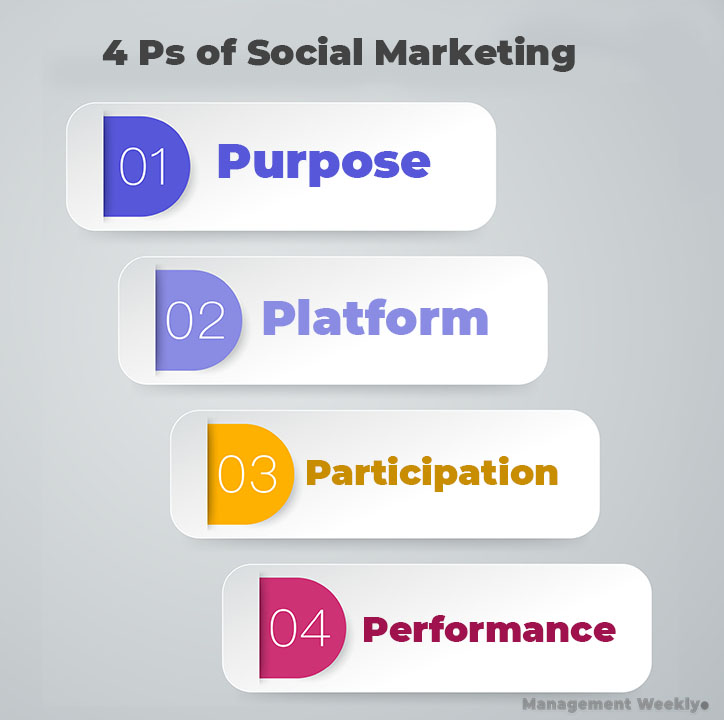What is exactly social marketing? How is social marketing different from regular marketing? In order to answer this question let us look into the 4 Ps of social marketing.
So what exactly is social marketing?
What are the biggest criticisms of marketing is that it is too capitalistic. In other words, marketing primarily benefits the firm. However, it is not entirely true. All firms directly or indirectly benefit society at large. In the same vein, social-centric firms, actively pursue this goal. Social marketing can help them achieve this goal.
Social marketing attempts to ameliorate some of these criticisms. Firstly, it provides marketing tools to promote social well-being. The core philosophy of social marketing is that marketing should be driven by the goal of helping society. Secondly, the techniques that are used in social marketing are broader in scope. Directs the focus of action from pushing to interaction with the customer. Thirdly, the channels of social marketing are different. Traditional marketing focuses more on selling the product through traditional channels.
4 Ps of traditional marketing
We have covered the 4 P’s of traditional marketing in another article in detail. You can read it to have a better understanding of the marketing mix. However, we will cover that briefly here.
- Product: In the simplest sense of product is what the company provides the customers in exchange for money.
- Price: Price is the money that the customer pays for the product.
- Place: The place strategy in marketing mix is about the location where the transaction between the customer and the firm happens.
- Promotion: As the name suggests the 4th P is about letting the customer know that you are selling a product at a given price at a given place.
Kotler and Zaltman extended the idea of the four P’s of the marketing mix into the social world. This suggested that the traditional makes were not conducive enough to understand social marketing.
4 P’s of social marketing
This brings us to the main discussion. The 4 Ps of social marketing is somewhat different from the traditional ones.

We have already discussed that social marketing is focused on social benefits. However, let us see what this means for the 4p? This means that the pillars of the marketing mix is very different. We no longer have the impetus on selling the products. I focus is more on serving society. In this light let us see what the four P’s of social marketing are:
- Purpose
- Platform
- Participation
- Performance
Purpose
Starting points for or developing your social marketing strategy is purpose. Clearly defining the purpose will provide you with a direction for your marketing efforts.
Firstly, the purpose should be deliberated carefully.
Secondly, we should write down the goals. Goal setting is another simple but effective task.
Thirdly, these goals should help us delineate the tasks and roles for the managers.
Fourthly, we need to ascertain the key performance indicators for our goals.
Platform
The second important criterion for social marketing is the platform. Platforms are the channels through which we can communicate with the customers.
Firstly, the choice for the platform. There are different activities that can be facilitated by a platform. Based on these activities we need to decide which platform to choose. Activities like interaction with the customers, service requests, and customer support, and relationship marketing.
Secondly, we should also look at the size of the platform. Social media platforms like Facebook and Instagram are quite popular. They have billions of followers around the world.
Thirdly, look at the kind of fitment between the demographic using the platform and our target customers. For example, if you want to market embroidery products then Pinterest is a great social media platform. On the other hand, if you want to market your B2B services then LinkedIn is more suited.
Participation
The next P of the 4 Ps of social marketing is participation. This can make or break your social marketing plans.
Firstly, unlike traditional marketing, social marketing relies heavily on the use of interaction rather than one-way communication.
Secondly, the firm should have a personal when it is communicating with the customers.
Thirdly, we should remember that the focus is on the benefit of society. Each and every interaction must reflect this ideology. We are there for the greater good.
Performance
Finally, we come to the fourth P of social marketing. Performance can help us understand how well we are executed the other three 3Ps.
We had earlier talked about the KPIs. These Key Performance Indicators or KPIs are critical to monitor marketing efforts.
There can be different ways to measure performance. Firstly, we can measure it in terms of the number of people served. Secondly, we can also measure it in terms of the return over investment. The first method can help us satisfy external stakeholders. On the other hand, the second one helps us satisfy the shareholders.
The 4 Ps of Social Marketing philosophy
What exactly is the social marketing philosophy? When we talk about social marketing it is important to understand how we define the benefits reaped by the customers.
Firstly, in terms of the product, there are a few changes. When we talk about social marketing anything that we sell must have some benefit for society. It is not just the needs of the customers that we need to fulfill. It needs to serve some larger purpose.
Secondly, we need to discuss the price of the product. The focus of the pricing should be to maximize the reach of the benefits to society.
Thirdly, we need to talk about the place. The place in traditional marketing is the location of the exchange between the customer and the firm. In social marketing, the choice of the place should be driven by the goal of making it more accessible to the people.
Fourthly, the promotion also needs to be thought of in a different way. The promotion needs to be more interactive and customer-centric.
